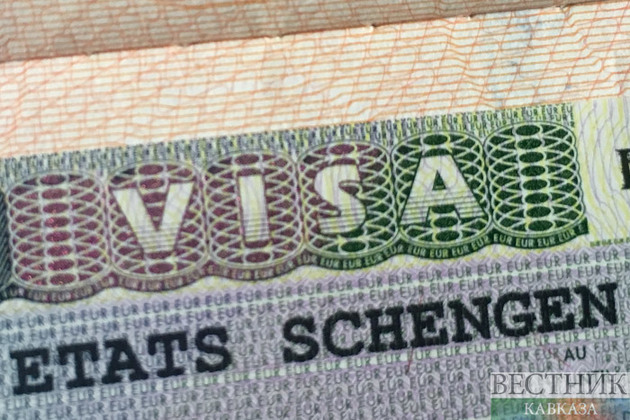Harmatullah Rafiei, chairman of the board of directors of the Iran Tour Operators Association, said on Monday that European embassies have started suspending processing visa applications and the issuance of new Schengen visas without official notice, Middle East Eye writes.
Nasser Kanaani, Iran's foreign ministry spokesperson, told reporters on Monday that if the news is true then this "restrictive measure is not acceptable". "Applying restrictions on the travel of Iranian citizens by European countries is contrary to what they declare. On one hand, they emphasize the issue of respecting the rights of Iranian citizens and on the other hand, they create restrictions for the travel of Iranian citizens," Kanaani said. "This approach is contradictory and I hope this news is not true," he added.
Some observers believe that the decision, which comes in the wake of Mahsa Amini's death in police custody over her attire, is likely due to concern amongst European countries over a possible spike in the emigration of Iranians amid the ongoing unrest.
The spokesperson of Germany's foreign ministry emphasised on Monday that the visa-issuing section of the embassy in Tehran continues its activities as normal and that visas are issued both at the national level and at the Schengen level according to the regulations. Poland's foreign ministry also announced that the consulate is active in Tehran and is still issuing visas. The ministry stated: "We inform you that we have no plans to suspend our activities." The Czech embassy told MEE they were "working normally." "We inform about all changes on our website," said spokesperson Lukas Gavenda.
Despite this, Ezzatollah Zarghami, the tourism minister of Iran, seemed to indirectly confirm the reports. "Europeans showed that they do not have the power to recognise their national interests. For a long time, they have become the toys of America and the Zionists and have deprived themselves of any independence. Their union is more messed up than ever. Confused, hasty and emotional and uncharacteristic behaviour!"
Visa appointments cancelled
The manager of a tour travel agency in Iran told Middle East Eye that although no official memo has been circulated, visa appointments have been cancelled since the start of the month. "The ban has not been explicitly announced, but some embassies have started cancelling visa appointments for the travellers since 1 October," he said. Asked about the likely reason behind this decision, the manager told MEE: "The reason is not in our field of work and we do not know. The embassies themselves know the reason for this issue." A visa officer of an airline agency confirmed the informal ban to MEE. "The embassies have said that they are suspending the issuance of visas, for the time being, we only know this much," he said. "It seems that the reason was the recent unrest."
Protests have been ongoing in Iran for nearly a month over the death of Mahsa Amini, the Kurdish woman who died in hospital on 16 September after being detained by Iran's "morality police" for "inappropriate attire". Iran's government has been widely criticised by western countries over the crackdown.
'Iranian people being punished'
The reported ban has prompted mostly negative reactions on social networks amongst Iranians, who said the visa suspensions contradict the official line by many European states who say they stand on the side of the people. "The European Union proved its practical sympathy with the Iranian people by cancelling visas (probably for fear of immigration)," Reza Kashef, a political activist, wrote. Peyman Molavi, an Iranian economist, tweeted: "I read in the news that some member countries of the Schengen zone have suspended the issuance of Schengen visas! And the reason is the possibility of Iranian immigration. In pro, they are supporting the people [in protests], but in reality, they are restricting the issuance of visas! This is regretful."
"I wonder why instead of the Iranian government, Iranian people are being punished. Why is it that every time Iranians protest, European embassies fear Iranians more than Islamic Republic's establishment?" he wondered. "This reminds me of the ridiculous rationale of Americans when they say they want to punish the Iranian government by sanctions while the sanctions have mostly hurt ordinary people," - some journalists wrote.
Not the first time
This is not the first time that Iranians are facing difficulties in getting a Schengen visa. In the unrest that followed the 2009 presidential election, European embassies refrained from issuing visas for many applicants. The Tehran-based journalist said the difficulty in getting visas back then had led to the creation of a black market for European visas, where some insiders within and outside European embassies sold Schengen visas for millions of toman.
A diplomat who served in a European embassy in Tehran in 2009 denied that a ban had been placed at the time but recalled that they were under pressure for not issuing visas. "We issued visas for Iranians normally. As far as I remember they were normal visas requested by Iranians under ordinary procedure. Of course, we were under pressure and worked under severe conditions. But visa issuing was not stopped," the diplomat, who asked not to be named, told MEE. The visa limitations after 2009 started easing following the 2015 nuclear deal, the journalist told MEE, but they never went away fully.






